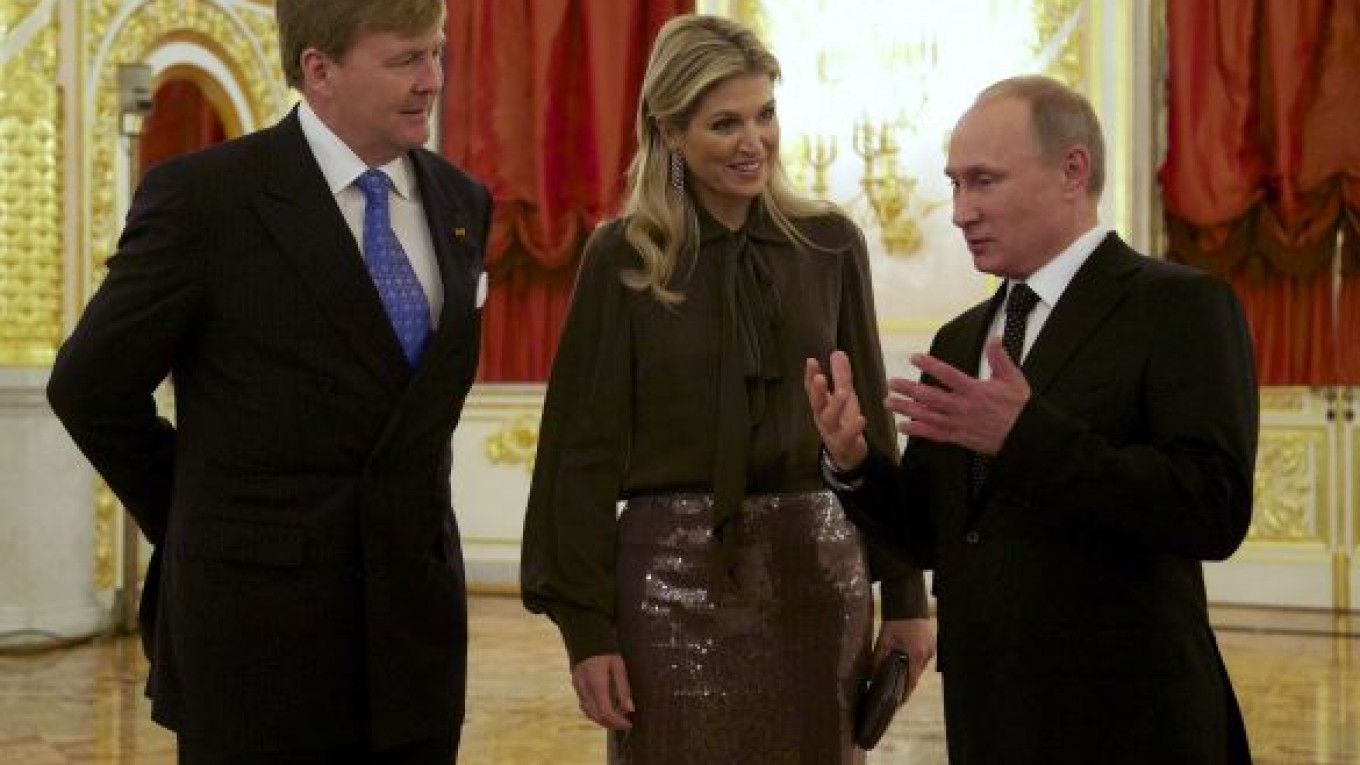Russia criticized the Netherlands before talks with the Dutch king on Friday, accusing it of "inaction" in not preventing a Greenpeace protest at a Russian Arctic oil rig in which 30 people were arrested.
Hours before President Vladimir Putin and Dutch King Willem-Alexander met in Moscow, Russia's Foreign Ministry said the Netherlands was to blame because the Greenpeace icebreaker involved was registered in Amsterdam.
The Sept. 18 protest against oil drilling off the Russian Arctic coast has strained relations between Moscow and The Hague.
Foreign Ministry spokesman Alexander Lukashevich told a regular ministry briefing that the "provocative action" by Greenpeace, in which some of the activists tried to scale Moscow's first offshore oil rig in the Arctic, had "grossly violated" Russian law.
"The whole situation, to a large extent, is caused by inaction of the Dutch state … when it was clear the vessel entered the Russian economic zone on purpose to knowingly carry out unlawful actions," Lukashevich said.
Ties have also soured over Russia's treatment of gays, including a law that prohibits the spread of "homosexual propaganda" among children but is seen by critics as a broad ban on gay-rights rallies, and over tit-for-tat incidents involving a Dutch diplomat in Moscow and a Russian one in The Hague.
Greeting King Willem-Alexander and Queen Maxima, Putin expressed satisfaction that the disputes had not prompted them to call off the visit and suggested it could help overcome tension he hinted was the fault of people at lower levels.
"I am very pleased that we have such a royal resource for building our relations," Putin told the couple in an ornate Kremlin reception room. "Despite some rough spots in the diplomatic service, the king's visit has taken place."
In the Netherlands, Dutch Prime Minister Mark Rutte said the king would not raise the matter of the Greenpeace activists because he is not a political figure.
He said it might come up in talks between Russian Foreign Minister Sergei Lavrov and Dutch Foreign Minister Frans Timmermans, but that the Dutch were unlikely to stress the issue in conversation while the matter was being heard at the International Tribunal on the Law of the Sea.
Russia has refused to take part in a hearing at the Hamburg-based tribunal, in which the Netherlands is seeking the release of the 28 Greenpeace activists and two journalists from pre-trial detention.
Russia has said it repeatedly asked the Netherlands to halt the Greenpeace protest at the Prirazlomnaya oil platform, owned by state-controlled energy company Gazprom, before its coast guards intervened.
Lukashevich's remarks appeared intended to defuse criticism over what is seen in the West as Moscow's heavy-handed treatment of the activists. They are awaiting trial in Russia on hooliganism charges punishable by up to seven years in jail.
"The final decision on that matter will be made by a Russian court. Nevertheless, the Netherlands continues pushing for the immediate release of all the Arctic Sunrise crew members," Lukashevich said.
The 30 have been held in Russia since its border guards forcibly boarded their icebreaker after the protest.
Russian investigators charged them with hooliganism to replace original charges of piracy, which would have been punishable by up to 15 years in jail.
A Message from The Moscow Times:
Dear readers,
We are facing unprecedented challenges. Russia's Prosecutor General's Office has designated The Moscow Times as an "undesirable" organization, criminalizing our work and putting our staff at risk of prosecution. This follows our earlier unjust labeling as a "foreign agent."
These actions are direct attempts to silence independent journalism in Russia. The authorities claim our work "discredits the decisions of the Russian leadership." We see things differently: we strive to provide accurate, unbiased reporting on Russia.
We, the journalists of The Moscow Times, refuse to be silenced. But to continue our work, we need your help.
Your support, no matter how small, makes a world of difference. If you can, please support us monthly starting from just $2. It's quick to set up, and every contribution makes a significant impact.
By supporting The Moscow Times, you're defending open, independent journalism in the face of repression. Thank you for standing with us.
Remind me later.






